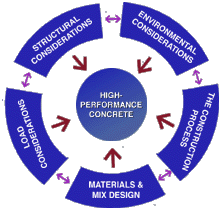High performance concrete (HPC) has been defined as concrete that possesses high workability, high strength and high durability. ACI (American Concrete Institute) has defined HPC as a concrete in which certain characteristics are developed for a particular application and environment. Under the ACI definition durability is optional and this has led to a number of HPC structures, which should theoretically have had very long services lives, exhibiting durability associated distress early in their lives. ACI also defines a high-strength concrete as concrete that has a specified compressive strength for design of 6,000 psi (41 MPa) or greater.
High Performance Concrete (HPC) is a concrete made with appropriate materials combined according to a selected mix design; properly mixed, transported, placed, consolidated and cured so that the resulting concrete will give excellent performance in the structure in which it is placed, in the environment to which it is exposed and with the loads to which it will be subject for its design life. Mix proportions for high-performance concrete (HPC) are influenced by many factors, including specified performance properties, locally available materials, local experience, personal preferences, and cost. With today’s technology, there are many products available for use in concrete to enhance its properties.
The primary application for HPC have been structures requiring long service lives such as oil drilling platform, long span bridges and parking structures. HPC still requires good construction practice and good curing to deliver high performance.


Yeah its nice
ReplyDelete